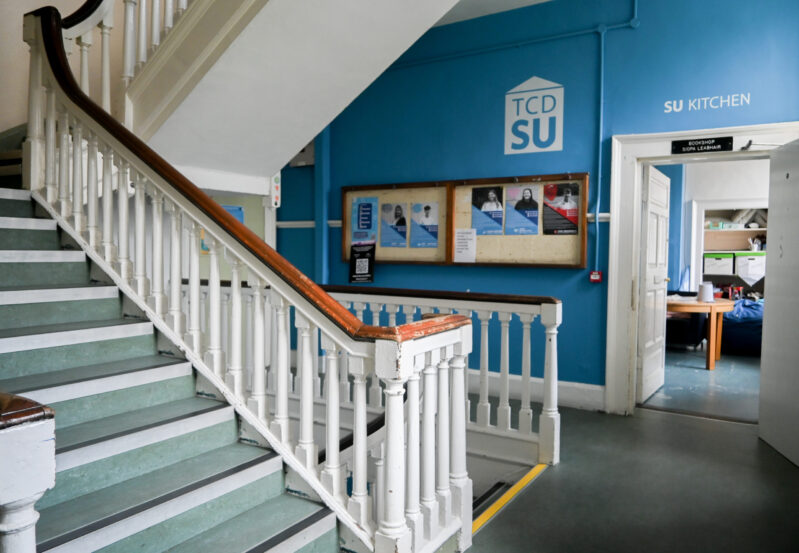Hamza Bana’s campaign to be the next Welfare and Equality Officer is founded on his lived experience. He is one of three candidates running for Welfare Officer in the 2024/25 Trinity College Dublin Student Union (TCDSU) Sabbatical Elections.
The third-year Computer Science and Business student is currently serving as the Ethnic Minority officer for TCDSU, a part-time position within the union that is responsible for enforcing mandates related to racial justice and ensuring ethnic minority rights are enforced. This position has given Bana valuable experience dealing with casework regarding issues of racial and ethnic discrimination.
Bana is no stranger to issues of accessibility and welfare, first coming to Trinity College through the High Education Access Route (HEAR) scheme in 2021. They have been an ambassador for the Trinity Access Programme (TAP) since February 2023 and were previously an S2S mentor for the academic year 2022/23.
According to Bana, through these positions, he noticed that there were a “lot of issues” on campus “that have not been addressed”. Through his role as Ethnic Minority Officer and as a black person, Bana noted that there “hasn’t been much of a fight for ethnic minorities on campus”. If elected Welfare Officer, they believe they “will be able to use [his] knowledge as a black person to combat the issues I see on campus”, adding they will also have the ability “to look after all other students on campus”.
Issues of equality are a primary tenet Bana is running his campaign on. Their first manifesto point is the decolonisation of the Trinity campus, beginning with the goal of having Diversity and Sensitivity Training a compulsory undertaking for teaching staff.
Bana wants Trinity to be “for all the students – students with disabilities, students from different minority backgrounds, students with different sexual orientation – any students that are not white, cis males”. Bana continued to say his goal is “trying to make sure Trinity is catered towards everyone, not just the few, fortunate people”.
Another aspect of this goal, overlapping with both concerns regarding welfare and equality, is the Ethnic Minority Support Group Bana spearheaded the formation of.
Another element Bana is keen to emphasise is continuing to put pressure on Trinity for the provision of free menstrual products across campus, citing the University of Galway, University of Limerick and University College Cork as examples of universities that have adopted this already. Current Welfare Officer Aoife Bennett has campaigned for free period products following the work done by Chloe Staunton who achieved funding of €7,000 from the TCD Association and Trust for the provision of hygiene products. He plans to “push Trinity for free period products across campus, not just the main campus but also in the James’ campus”.
Bana plans to advocate for better mental and physical support across campus for all students and “not just cis white males” by continuing sex education workshops with Q-Soc and pushing for better housing rights, critiquing the current status of campus residents as “licensees” and promising to work on this issue alongside the elected president.
When it comes to Trinity’s rising rents, Bana points towards the success of direct action undertaken by the TCDSU over the year, calling it a “great success”. Following on from the rent freeze achieved through the blockade of the Book of Kells, Bana plans to combat Trinity increasing fees next year. “I want to basically push and say, ‘Hey, you can’t do that.’” They believe that “students are the backbone of the university and Trinity should treat us as students that are coming from different backgrounds that aren’t able to afford these rising prices”. When asked what policies they could undertake, Bana proposes that TCDSU should “combat this” by pushing Trinity to cap rents so that they amount to “a third of the living wage monthly”.
In terms of sexual well-being, Bana plans to “increase visibility for the First Responder Training for Sexual Violence”, a course they have received a training qualification in. At present, information on this course is “only circulated through the Trinity communication emails and not many people actually read those”. He plans to increase visibility through adding it as an essential part of campaign weeks dedicated to welfare, such as “sex-education week or consent week”.
When it comes to equality, Bana is dedicated to ensuring students of colour have a sense of belonging on campus. One way he plans to achieve this goal is by making inclusivity and diversity training mandatory. Whilst it is currently available for all teaching staff, it is not required – a fact Bana was made aware of “during [their] time as Ethnic Minority Officer”. He would “like to push college to make this mandatory for all staff on campus”. Bana continued to say that “as a black person, I don’t feel a sense of belonging on campus”.
Drawing on the experience they have gained as the Ethnic Minority Officer, Bana explains that he has learned that “many international students feel left out of their lectures”. He expanded to say they had been made aware of situations where students, “particularly Chinese international students” had been mocked by their teachers for their accents and had their names disrespected.
Bana believes that “attacking the problem at its source by educating the staff that perpetuate the exclusion of these groups” by enforcing “mandatory sensitivity training” is the way to ensure inclusivity “for these marginalised students”.
Student mental health support has been an ongoing issue, one that Bana has had success with already this year. They note that in the last five months, they have “worked towards securing a POC person within the counselling service”, a point of representation that did not previously exist within student counselling services. Bana deems it “problematic” for POC students entering the service who want a therapist that “reflects their background because they have that lived experience”. During their term as Ethnic Minority Officer, Bana has “outsourced a black therapist who comes onto campus and runs a support group for ethnic minorities” that will be beginning from March 4th, something Bana is “very proud” to have founded.
“Not only will there be another therapist available, it will be a therapist tailored towards ethnic minority groups”. One of Bana’s central aims is to “continue hiring more POC therapists so there is less of a strain on the general support groups”, which will both create more openings within the general groups whilst simultaneously providing POC with the counselling they originally sought out.
Ultimately, Bana believes that the possibility of him being elected would “mean more towards the students” than it would for him. “Having a Welfare Officer that is POC is quite enormous. If you’re a POC, you would rather have a POC therapist to go to. If you’re a woman, you’d rather have a woman therapist to go to”.
“As a person of colour, students who are POC will feel more safe going to someone with the same experience with their problems. I know myself I feel more comfortable going to someone I know has the same experience as me”.
Bana concludes on a positive note, drawing once again to the five short months they have been the Ethnic Minority Officer showing that “[he] can make positive changes” and it would be “amazing” to be elected as the next Welfare Officer.







